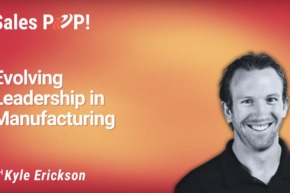Getting sales training to stick and become the daily work practice of the salespeople can be difficult. Many pieces of training are based on theoretical situations, or encourage exploration of ideologies, but do not get down to: How do you actually do it? What is the piece that the salesperson takes away that actually makes a difference? These questions are answered and more in this video interview with Tom Haller by John Golden.
In this expert sales interview it’s all about sales training:
- What’s the secret to getting sales training to really stick and become the work practice of salespeople?
- The role of practicing as a salesperson
- Understanding your customer’s industry
- Creating qualifying results
- Giving advice in a manner that is measurable and repeatable
Practice Makes Perfect
Professional sports players practice multiple times a week in preparation for game day. However, it’s not as often that salespeople actually practice their skills. In training, Haller encourages trainers to teach based on real examples, not just role-plays. These real examples help salespeople orient themselves and prepare for the real tasks ahead.
Understanding the Industry
Applying these practices in real life situations also helps the salesperson understand the impact that their product will have on a company as a whole, not just at a product level. Ask yourself, “what will this product do for the business as a whole?” “How will this impact the business?” These kinds of questions help a salesperson understand the impact that their product or service could have on the company as a whole. This method of training helps broaden the perspective and helps the salesperson get on the same page as the consumer.
Qualify.
Qualifying results and understanding the impact that your product or service could have on the industry helps a salesperson understand the value of the effort they are or are not going to put into making the sale. People, time, and money are all very important factors in the ultimate finalizing of a sale. If a consumer does not have the resource, it can become a bad deal from the start. Haller refers to the term “hopium” to describe the hope a salesperson has when trying to close a sale, but stresses that too much of this hope can be a time waster if it takes away time from making sales with companies that actually do have the resources. You only have so many hours to make deals. If you spend 80% of your time working on deals that never close, then you only have 20% of your time to make the quota.
Give Measurable Advice
Haller advises against giving people coaching on things that you cannot be measured. In order to train people, it is crucial that trainers provide information that can garnish results that are both measurable and repeatable.
Often times, well-meaning trainers will give advice that is “nonsense,” when the person on the receiving end of the advice doesn’t really know how to apply the advice. Haller suggests scheduling a time once a quarter to talk about skill progression, and train specifically on certain skills like understanding the industry, creating qualifying results, etc.
.
About our Host:
John is the Amazon bestselling author of Winning the Battle for Sales: Lessons on Closing Every Deal from the World’s Greatest Military Victories and Social Upheaval: How to Win at Social Selling. A globally acknowledged Sales & Marketing thought leader, speaker, and strategist. He is CSMO at Pipeliner CRM. In his spare time, John is an avid Martial Artist.
Pipeliner CRM totally enables sales training. Get your free trial of Pipeliner CRM now.







Comments